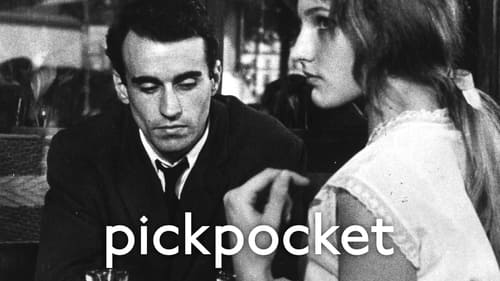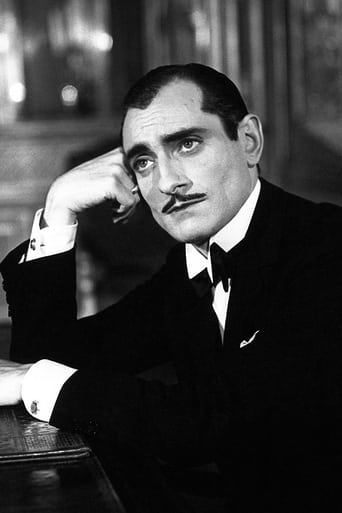Solemplex
To me, this movie is perfection.
Listonixio
Fresh and Exciting
Doomtomylo
a film so unique, intoxicating and bizarre that it not only demands another viewing, but is also forgivable as a satirical comedy where the jokes eventually take the back seat.
Casey Duggan
It’s sentimental, ridiculously long and only occasionally funny
chaos-rampant
More interesting than any individual film, it's Bresson's philosophy that I feel is worth examining. He's all about striving, the question is what for? If it's purity, as most would agree, and purity always seems like something to aspire to, is it a purity that we can take as a base for living?I don't think I will have conclusions before Balthazar, perhaps his most famous. Already, since Diary of a Priest, I can see him moving in a direction, growing that philosophy. Even more sparse, even more laconic, removes flourish and leaves bare floors so that we endure something being revealed in the pacing. That's fine. More revealing is another trajectory being delineated, human- based.It's once more about a lone youth who struggles with a life that suffocates. In Diary he was a pious young priest who wanted absolute sincerity in the face of life; but people were complicated beings, the journey caused spiritual torment, questions of angst abounded. In Man Escaped the same youth becomes a prisoner, also endures a life of anguish, but now endures quietly, without torment and piety. It was Bresson peeling away the romanticizing of suffering of Diary, what was left was simply the work of breaking free from that prison- world, stoicism in place of romanticism.So what does he do in this next one? The same youth once more, but now he's not bound by duty to truth or has any work set out before him. Now he's free to wander the world which the man in Escaped had struggled to break free to. Without an intellectual or other struggle before him, he's simply awash with time. He's stifled by the freedom, he has no place. He perceives himself as a man of lofty talents, possibly a genius, but wastes these talents in being a pickpocket around town who won't even go see his dying mother. He always comes and goes from his tiny apartment to no real purpose.Observant viewers will note the equation of pickpocketing as presented in the film, an elaborately precise choreography of hands and motions, with Bresson's own filmmaking. Film lore touts him as pure and simple as if that simplicity is conquered without effort, in truth he's all about the meticulous timing and moving of exact pieces. His favorite tool is exactly this game of hide and show that controls what we see; for example a scene like in Man Escaped where the new cellmate is introduced off-camera, we don't know who our man is talking to until we turn to see. He does it here too, often by having characters turn and leave, questions hanging, creating gap and resonance. He's the opposite of natural.Back to the conundrum expressed at the beginning however; if this is pure, what does it strive purely for?The only answer I get here is that we no longer have a man who is trying to understand life, or someone who works towards an end, these selves have been shed. Now we have someone who endures, but has no idea exactly what or what for. It's Bresson inching towards the same cessation that he strives for visually. What stands before him now is what he sketches in the opening intertitle; something pushes the man from the inside.He bangles this all up at the end, and I believe that looking back he would probably have been unsatisfied himself. He reverts back to his romanticism where the tormented young man has love reserved for him, but a wistful love that doesn't feel earned, there's simply nothing that rings true about her infatuation with him. This is Eva Green's aunt by the by.So this has done its job, shed one self and one set of conundrums and replaced them with another. Onwards to his next, which looks like another draft of the same philosophy, and then Balthazar is around the corner. I already believe I disagree with Schrader.
Ore-Sama
Robert Bresson is one of those directors often listed among the highest tier of film making. Even cinematic elites like Andrei Tarkovsky hold him in the highest esteem, and "Pickpocket" is one of the highlight films of his career. The film centers around Michel, a character often compared to the protagonist of Dostovesky's "Crime and Punishment", but I would say he's closer to "A Raw Youth", the story of a young man who rejects the ideals of his elders and seeks to live in society on his own terms. In this instance, it's through pit pocketing. But it's not just a means to survive for Michel, it's a way of life, an art, an obsession, a thrill. Even he knows if he continues this way of life, his downfall will be imminent, and yet he can't stop. Again we can compare with many a dostovesky protagonist, a pitiful man who brings about his own downfall, yet can invoke a sense of empathy. They are not monsters, they are, tragically, flawed.It is this level of intricacy in the storytelling that helps give the film it's raw power. Watching this the first time, I didn't even notice that the actors gave completely mechanical performances, rarely if ever emoting, a purposeful choice on the part of the director. So masterful is the storytelling, both in the writing and the direction, that it feels like I felt like I saw the emotion myself.I can't not talk about the cinematography. Much has been said about the pickpocket scenes themselves. The only tool Breson uses is close ups, just enough to let the audience see what is going on, and through that suspense is created. I have to believe this film was an influence on directors such as Peter Yates, who would use similar techniques for crime thrillers like "Bullit" and "The Friends of Eddie Coyle".Even without the suspenseful pick pocketing scenes, every shot is precise. The highlight shot of the film for me is when Michel is standing outside in a small crowd, the wind blowing by him. In a film focused on objects and materials, somehow the wind never looked more beautiful.Although the film is certainly on the artsy side, don't let that deter you. The film, much like Truffaut's "The 400 Blows", is very straight forward and easy to follow on a story telling level. If you enjoy films like "Taxi Driver" (on which this film was an influence), then this movie is for you.
Boba_Fett1138
No doubt that this is a very well done film but it at the same time also isn't the best or most effective one within its genre.The movie has the same sort of story and approach as for instance the other European movies "Ladri di biciclette" and "Umberto D." but big difference with those movies is that you never feel the same sort of desperateness that the main character must have had. I just never felt it was a necessity for the main character to be a pickpocket. Surely he could had gotten a straight job, if he tried hard enough. It was just a way of life that he had picked for himself because it was one of the most easy things for him to do and felt more comfortable doing that than an actual normal job. The movie therefore felt kind of less involving and powerful to watch, than the earlier mentioned similar type of movies.The main character also falls kind of flat due to the quite weak acting within the movie. Martin LaSalle's face remains basically the same throughout the entire movie, so all of the emotions also already fall kind of flat due to all of this. Apparently this was a type of acting-style that Robert Bresson liked but I'm just not much into it or impressed by it at all.And the story also just doesn't work out that interesting because of all of that. The story gets mostly saved by the fact that the movie is being an extremely short one and therefore never starts to drag. It's not like the story is dull but it's just the type of movie that tries to pick a more realistic approach, with a more realistic and everyday type of story, in which not always an awful lot (interesting) is happening.But oh well, it's still a very well shot film, so the movie remains for most part still a real pleasure to watch. All of the pickpocketing scene's are quite well done and show the art and skill that goes into it. No doubt some people, with criminal intentions, are taking notes from this movie, just like the main character from this movie was taking notes from a book.A good watch but at the same time also a movie that you can easily do without.7/10http://bobafett1138.blogspot.com/
aarondevoll
Pickpocket involves a young man named Michel. He develops thievery as a hobby and soon meets another man who teaches him his craft.Shortly after, Michel is arrested. While in jail, everything is put into perspective for him and he reflects on his past crimes.After he is released, Michel's mother dies right before his eyes. His friend Jeanne tries to help Michel with his problems but like before, he reverts back to a life of pick pocketing.Michel realizes that he is under suspicion and flees the country for two years. When he returns, his desire to pick pocket has him put in jail again. Jeanne visits him and they both share a loving moment for each other.9/10. A simple plot that is masterfully directed. Pickpocket shows the point of view of a misunderstood person in a harsh, unforgiving world.





